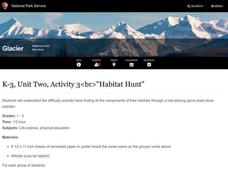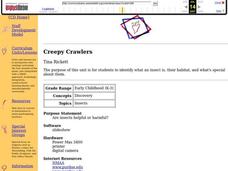Curated OER
Know It All: Seals! Teaching Plan
Pupils discover information about seals, including behavior and habitat. In this early childhood lesson plan, students identify various aspects about seals. Pupils create an illustration or painting of their favorite seal, and write a...
Curated OER
Design a Reef!
Students design a functional model of a coral reef ecosystem. For this coral reef lesson, students identify the energy sources and material cycles of a coral reef. They write an essay about their niche in their own ecosystem.
Curated OER
Who Lives Here: Otter, Grey Squirrel, Badger, Rabbit or Fox?
In this animal habitat worksheet, students read five clues pertaining to the homes of the otter, grey squirrel, badger, rabbit and fox. Students tell what animal lives in each place. This appears to be an online interactive worksheet.
Curated OER
Critters in the Classroom
Young scholars investigate with sea urchins. For this ocean habitat lesson, students observe sea urchins and other ocean grazers. Young scholars work with lab equipment to examine the anatomy of these creatures.
Curated OER
Habitat Hunt
Students discover how hard it is for animals to find all the items needed in their habitat. In this habitat lesson, students play a game in which they pretend to be an animal, they discover that not all animals can find the food needed...
Curated OER
Biomes/ecosystems
Fifth graders examine ecosystems through a variety of activities including an Internet hunt, work at centers, and building a diorama on a specific habitat.
Curated OER
Mangrove Ecology and Adaptations
Learners create a plant or animal that would be well adapted to a habitat they selected. They first learn about Mangroves and their specific adaptations that help them survive in their habitat.
Curated OER
Bivalve or Univalve (Clam or Snail)?
Fourth graders explore the meaning of the prefixes "bi" and "uni." In groups, 4th graders observe pictures of shells and handle real shells. Students create a chart to classify each shell as a bivalve or univalve. They identify the...
Curated OER
Oh No! Oil Spills
Students discover the threats of an oil spill. In this ecological awareness instructional activity, students examine the effects of oil spills on animals and our oceans. Students get simulated oil on themselves and discover...
Curated OER
Plants and Animals of Great Bay Animals and Plants of the Estuary
Students participate in a webquest about the plants and animals that inhabit an estuary. They role play as environmentalists researching this habitat and present the results of their research in a creative way.
Curated OER
Forest Food Web
Students explore the elements of a forest ecosystem. They examine the elements needed to form a forest food web. Students construct and describe food webs that include nonliving elements of the ecosystem.
Curated OER
Creepy Crawlers
Students identify the characteristics of an insect and their habitat. They read books about insects, research different types of insects, and create their own insect art. The project also includes the creation of an insect song and...
Curated OER
Habitat for Plants! There's No Place Like Home!
Students compare and contrast conditions necessary for survival of aquatic and terrestrial plants, identify common and scientific names of plants,
and determine correlation between location and plant characteristics. Students then use...
Curated OER
Coastal Threat: A Story in Unit Conversions
Students convert measurements from one unit to another. In this math lesson, students study the environmental consequences of oil spills. They replicate an oil spill event by modeling and scaling.
Curated OER
Into the Sea
Students display an awareness of the diversity of species in the coral reef, their habitat and adaptations. They conduct research to find and then color code the locations of coral reefs around the world.
Curated OER
Extinction
Students explore reasons why the dinosaurs became extinct, and the specific needs (habitat, environment, food) of individual types of dinosaurs.
Other popular searches
- Elementary Science Habitats
- Life Science Habitats
- Ks2 Science Habitats
- Desert Habitats Science
- Esl Lessons Science Habitats
- Science Habitats Lesson

















